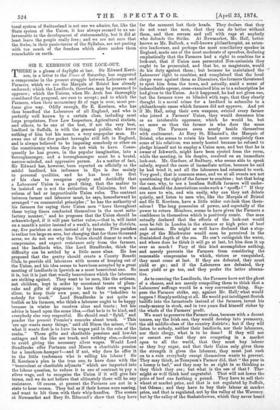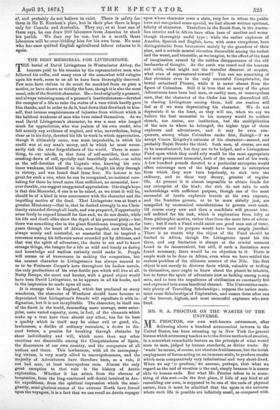SIR E. KERRISON ON THE LOCK-OUT.
THERE is a gleam of daylight at last. Sir Edward Kerri- son, in a letter to the Times of Saturday, has suggested a compromise in the present struggle between Labourers and Farmers, which we see the Marquis of Bristol has already endorsed; which the Landlords, therefore, may be presumed to approve ; which the Unions, when Mr. Arch has thoroughly considered the proposal, are sure to accept ; and to which the Farmers, when their momentary fit of rage is over, must per- force give way. Oddly enough, Sir E. Kerrison, who has thus benefited the Labourers of all England, and who is perfectly well known by a certain class, including most large proprietors, Poor Law Inspectors, Agricultural statists, and others, to be one of the best, if not the very best, landlord in Suffolk, is with the general public, who know nothing of him but his name, a very unpopular man. He owns one of the five pocket boroughs still left in England, and is always believed to be imposing somebody or other on the constituency whom they do not wish to have. Conse- quently he has grown, in the popular imagination, into a boroughmonger, and a boroughmonger must be a brutal, narrow-minded, and oppressive person. As a matter of fact, Sir Edward has, however, been reported on officially as the model landlord, his influence in Eye is due mainly to personal qualities, and he has been the first of his class to recognise openly and decidedly that a Labourers' Union is a good thing, that the matter to be insisted on is not the extinction of Unionism, but the reform of bad or impracticable Union rules. The contract between farmer and labourer must, he says, henceforward be arranged " on commercial principles ;" he has the authority of his farmers for saying their Union men " have throughout these trying times conducted themselves in the most satis- factory manner," and he proposes that the Union should be acknowledged, if it will pass better rules,—that is, will insist on a month's notice instead of a week's, and strike by districts, say, five parishes at once, instead of by farms. Five parishes is rather too large an area, but changing that for three thousand acres, we do not see why the Union should demur to such a compromise, and expect resistance only from the farmers, and the landlords who, like Lord Stradbroke, think the difficulty can be settled by a little more alms. He has proposed that the gentry should create a County Benefit Club, to provide old labourers with means of keeping out of the Union, and his idea seems to have been accepted by a great meeting of landlords in Ipswich as a most benevolent one. So it is, but it is just that woolly benevolence which the labourers are striking against. They want to be men, like the artisans, not children, kept in order by occasional treats of plum- cake and gifts of sixpences ; to have their own wages in silver, to keep their own poor, and to be "beholden to
nobody for truck." Lord Stradbroke is not quite as foolish as his farmers, who think a labourer ought to be happy because in winter he receives alms and tracts ; but his advice is based upon the same idea,—that he is to be kind, and everybody else very respectful. He should read " Sybil," and ponder the present Premier's remarks about truck. " This 'ere age wants many things," said old Nixon the miner, "but what it wants first is to have its wages paid in the coin of the realm." These gifts and charitable pensions and low-let cottages and the like are truck, and nothing else,—devices to avoid giving the necessary silver wages. Would Lord Stradbroke offer Fortnum and Mason a charitable pension for a luncheon-hamper?—and if not, why does he offer it to the little tradesman who is selling his labour ? Sir E. Kerrison's plan is the true one, to have done with the "benevolent or charitable adjuncts " which are imported into the labour question, to reduce it to one of contract to pay a silver wage, and to recognise the Union if it will give fair terms, and we do not believe that ultimately there will be any resistance. Of course, at present the Farmers are not in a state to hear reason. They feel as if their horses were rearing, and want to hit them with their whip-handles. The scenes at Newmarket and Bury St. Edmund's show that they have for the moment lost their heads. They declare that they do not want the men, that they can do better without them, and then scream and yell with rage at anybody who defends the Strike. At Newmarket, Mr. Hall, better known as Mr. Bullock, a well-known philanthropist, an exten-
sive landowner, and perhaps the most conciliatory speaker in England, made one of the most moderate of speeches, declaring emphatically that the Farmers had a right to combine for a lock-out, that if Union men persecuted Non-unionists they ought to be prosecuted, and that he, as magistrate, would do his duty against them ; but because he maintained the • Labourers' right to combine, and complained that the local clergy were against them as Dissenters, the farmers threatened to eject him from the town, and actually, amid a scene of indescribable uproar, cross-examined him as to a subscription he had given to the Union. As it happened, he had not given one, but the farmers were so blinded with rage, that they clearly thought it a moral crime for a landlord to subscribe to a philanthropic cause which farmers did not approve. And yet if Mr. Hall, using their own weapons, evicted every farmer who joined a Farmers' Union, they would denounce him as an intolerable oppressor, which he would be, but no more so than the farmer is who does the same thing. The Farmers seem nearly beside themselves with excitement. At Bury St. Edmund's, the Marquis of Bristol, who seems to retain his head more completely than some of his relatives, was nearly hooted because he refused to pledge himself not to employ a Union man, and but that he is owner of Ickworth, might have been ejected from the room, while the meeting, in his despite, resolved on an immediate lock-out. Mr. Gardner, of Sudbury, who seems able to speak calmly, argued the cause of immediate action, because he said he had tried it, and all the labourers had returned to work. Very good ; that is common sense, and we at all events are not questioning the right of the farmer to combine ; but that being the case, why, to use a localism Suffolk farmers will under- stand, should the Associations make such a " spuffie ? " If they are sure to win, and win easily, why can they not debate quietly, and listen to men who, like the Marquis of Bristol and Sir E. Kerrison, have a little wider out-look than them- selves ? The long possession of power, and especially of the power to return Members, seems to have given the Farmers a confidence in themselves which is positively comic. One man actually declared that the effects of the lock-ont would soon be felt in London in the absence or high price of beef and mutton. He might as well have declared that a stop- page of the Blackwater would soon be perceived in the diminished depth of the sea. He can't extinguish the water, and where does he think it will go at last, let him dam it up ever so much ? Fury of this kind accomplishes nothing, and merely prevents the Farmers from considering the reasonable compromise to which, victors or vanquished, they must come at last. If they are defeated, they must yield or go ; and if the Labourers are defeated, they must yield or go too, and they prefer the latter alterna- tive.
As to coercing the Landlords, the Farmers have not the ghost of a chance, and are merely compelling them to think that a Labourers' suffrage would be a very convenient thing. Sup- pose the Farmers strike, say, against Mr. Hall; what would happen ? Simply nothing at all. He would put intelligent Scotch bailiffs into the farmsteads instead of the farmers, invest his ready-money in stock, and in two years find himself richer by the whole of the Farmers' profit.
We want to preserve the Farmer class, because with a decent tenure, say the Irish one, they would develop into yeomanry, the old middle-class of the country districts ; but if they will listen to nobody, neither their landlords, nor their labourers, nor their clergy, what is to be done ? If they will not or cannot see that they are competing in a market open to all the world, that they must buy labour as they buy sugar, and that their Union only gives them the strength it gives the labourer, they must just rush on to a ruin everybody except themselves wants to prevent. They may think, as Tennyson's Farmer did, that " the poor in a loomp is bad," and they may be as right in so thinking as they think they are ; but what is the use of that ? The', might as w311 think beef ungrateful. That will not lower the price of beef one farthing a pound. They have to sell their wheat at market price, and that is not regulated by Suffolk, but Odessa ; and they have to buy their labour at market. price, and that is regulated, not by the valley of the Waveney. but by the valley of the Saskatchewan, which they never heard of, and probably do not believe to exist. There is safety for them in Sir E. Kerrison's plan, but in their plan there is hope only for Canada and Australia. They say, or at least one of them says, he can draw 200 labourers from America to stock his parish. We dare say he can, but in a month those labourers will be over-bidding him for his own farm. No man who has once quitted English agricultural labour returns to it again.



































 Previous page
Previous page